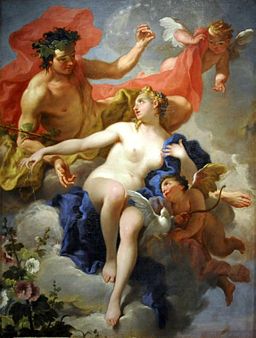Once upon a timeless time, on an island called Crete in the Mediterranean Sea, there lived a woman named Ariadne. One day she fell in love with a guy named Theseus and gave him a skein of string. Her idea was to have him unspool the string as he wound his way through a labyrinth to kill a monster at the center, after which he would turn around and follow the string back out to safety. Theseus was all for it even though concocting the scheme would have been far beyond his mental powers. Alas, when the deed was done, his valiant but scanty brain cells forgot to take Ariadne with him when he sailed back home to Athens.
Ariadne was standing on the beach, watching the ship disappear and wondering how she had fallen for such an outrageous airhead, when a gleaming chariot swooped down from the sky drawn by a pair of panthers. Holding the reins was no mere pin-up boy, preoccupied with flexing his mortal thews, but instead it was a god. It was Dionysus, one of the twelve great shining ones of the mighty Greek pantheon, and he was thrilled to find Ariadne. He leaped from the chariot, took her hands in both of his, and spoke in a voice that made her bones tingle. Come with me to Olympus, love. That’s where you belong. She replied, Are those panthers?? He gave her a wink and said, They’ll carry us to heaven if you’re willing. She cast one last glance over the empty ocean, turned back to the glory of Dionysus, and then she said, Yes.
 He kissed her hands and off they went. As a wedding present he gave her a fabulous crown which he later turned into stars. As the story goes, they loved each other ever after. You heard that right. Dionysus was the only one of the Greek gods who was able to handle commitment. What’s more, there are those who believe that in earlier times, Ariadne was a powerful goddess in her own right. If that’s the case, the story shows Dionysus raising the diminished goddess back to her rightful status. He’s also the god who gave us the gift of wine. So when you swirl a pinot noir in the belly of a wine glass, you’re swirling more than just a beverage. You’re swirling the spirit of Dionysus.
He kissed her hands and off they went. As a wedding present he gave her a fabulous crown which he later turned into stars. As the story goes, they loved each other ever after. You heard that right. Dionysus was the only one of the Greek gods who was able to handle commitment. What’s more, there are those who believe that in earlier times, Ariadne was a powerful goddess in her own right. If that’s the case, the story shows Dionysus raising the diminished goddess back to her rightful status. He’s also the god who gave us the gift of wine. So when you swirl a pinot noir in the belly of a wine glass, you’re swirling more than just a beverage. You’re swirling the spirit of Dionysus.
Who exactly is this swirling spirit? Well, Dionysus relishes life. He’s fun and he’s intense, with a spontaneity and exuberance that the other gods lack. He’s playful, faithful, raucous, ebullient. And remember, he’s immortal, so all his traits have divine proportions and nothing about him is bounded by time. We’re talking about spontaneity so powerful that it’s a religious experience, exuberance so profound as to become holy, and playfulness so deep as to render the passage of hours irrelevant. Dionysus can lift our moribund moods with his sacred zest, the way he lifted Ariadne.
Wine, however, like Dionysus, is strong, and it’s complex. It’s not a beverage for quenching thirst. It’s an elixir that demands respect. The right amount is an infusion of joy, but too much is a plunge into oblivion and regret. Wine can heighten celebration, stimulate conversation, and deepen friendship, but it can also deaden feelings, darken depression, and damage relationships. Remember the panthers who drew the chariot? Harnessed, they speed the journey of the soul. Unchecked, they can kill. Dionysus demonstrates the knack of harnessing.
 A glass of wine is a living thing, in the literal, biological sense, animated by the microorganisms that fermented the juice. It’s also a living thing in the senses of the imagination, exactly the way Dionysus is, so it doesn’t matter whether you actually drink wine or not. The idea alone honors his spirit and makes it easy to imagine partaking of life with the same enthusiasm as the shining one who cherishes and champions the goddess.
A glass of wine is a living thing, in the literal, biological sense, animated by the microorganisms that fermented the juice. It’s also a living thing in the senses of the imagination, exactly the way Dionysus is, so it doesn’t matter whether you actually drink wine or not. The idea alone honors his spirit and makes it easy to imagine partaking of life with the same enthusiasm as the shining one who cherishes and champions the goddess.
So whether the glass in your hand is literal, imaginal, or maybe even both at once, look into those jeweled tones. Inhale the bouquet. Swirl the wine until it’s dizzy, but most of all, listen. Can you hear the sacred question posed, to you and you alone? Can you hear the invitation? If you’re willing, if you say Yes, then lift the glass. Sip that spirit into yourself and savor the liquid epiphany, because the true gift of Dionysus is that he can take us all to heaven anytime we let him.
I’m gratefully swirling a little Dionysus right now.
I truly wonder what you’d make of some of the writings of Thorne Smith. “Night Life of the Gods” deals directly with the Greek/Roman pantheon dealing with prohibition-era America.
It’s light stuff, but I’d compare it to Wodehouse.
A mythological Wodehouse?? Oh wow that sounds fantastic!